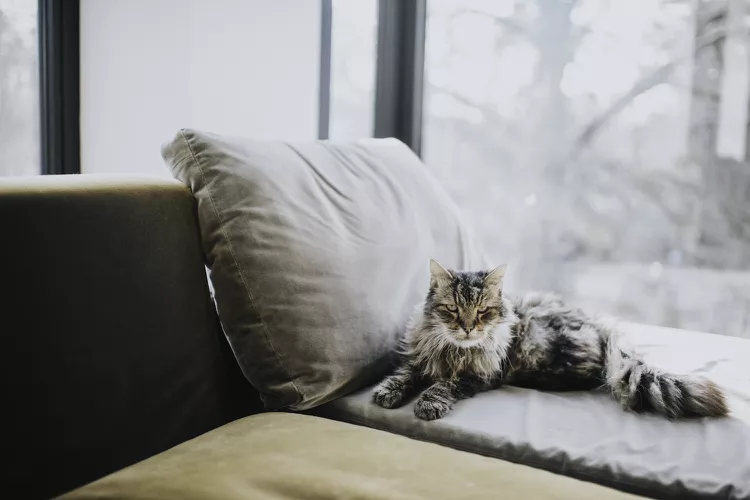Do Cats Have Menopause?

Have you ever wondered if cats go through menopause as humans do, and if so, at approximately what age? To understand how feline heat cycles work and how they compare to human fertility, you must first understand that, since cats do not experience menstruation in the same sense that human women do, menopause is a moot point. While cats have a "heat cycle," also known as "estrus," similar to the menstrual cycle of humans, very little—if any—blood is ever present.
Female cats may start their heat cycles at a very young age and, as polyestrus beings, are doomed to continue these heat cycles for life. Cats who don't mate can go into heat as often as every two to three weeks during the breeding season. According to several other sources, the oldest cat to give birth was Kitty, a cat who gave birth to two kittens at the age of thirty.
Heat Cycles
Some of the signs that your cat is in heat are very obvious. She may vocalize loudly and, if you have no whole male cats in the house, she may "call" while looking out the window, or standing at the door. Why? Because she has an urgent desire to mate and there will be willing and able tomcats waiting nearby to vie for her attention.
You can often tell that your female cat is in heat by certain forms of body language. She may spray vertical surfaces inside the house—the front door is a given for this activity. While backing up to the door, with her tail raised high and to the side of her body (which is also her position while mating), she will let go with a very strong-smelling stream of urine—the scent is unmistakable.
She will demonstrate very affectionate behavior. She may roll around on the floor a lot and lick her genitals constantly (please note: licking the genitals is also one of the symptoms of urinary tract disease (FLUTD), a condition which, if ignored, can turn very serious, very quickly). Of course, the heat cycles will temporarily cease should the cat become pregnant. Unless your own cat mates or is spayed, this pattern of symptoms will continue until well into her senior years.
How Many Kittens Can a Cat Have?
The average number of kittens in a single litter is four. However, this can vary greatly from pregnancy to pregnancy. There is no finite number of kittens a cat can potentially have in her lifetime, as it will depend on a number of variables:
- Mating Opportunity: Whether the cat is allowed outdoors or mated with a male cat at home. Obviously, mating opportunity equals impregnation. Also, cats are induced ovulators—meaning that they do not release eggs until stimulated by a male cat's barbed penis—another factor that will influence a cat's productivity.
- Health: A healthy cat will generally bear larger litters of healthier kittens.
- Veterinary Care: The normal term of feline pregnancy averages from sixty to sixty-five days. I routinely use sixty-three, because it is nine weeks, equating to the human pregnancy average of nine months. Again, the age of the queen, as well as her general health will contribute greatly to her term.
Using these factors and other data, you may estimate that (all other matters being equal) a cat could bear approximately twenty-five kittens during a one year period. However, all things are not necessarily equal when we are using theoretical mathematics.
Based on this estimate, and the fact that a reasonable number of cats live to fifteen or older, a 12-year-old cat could have given birth to 300 kittens up to that point. According to the Guinness World Records, a Texas cat named Dusty that produced 420 kittens, birthing her last litter in 1952. However, this is a very high number and most cats are inclined to bear smaller litters as they age, therefore that number could be reduced significantly.
Given the information presented here, it is important to strongly consider spaying your female cats. No matter how good an aging cat's health may appear, continual birthing can sap her strength and leave her debilitated. The other consideration is the huge cat overpopulation problems. Shelters overflowing with kittens have no room for homeless older cats, who will likely be euthanized as a result.